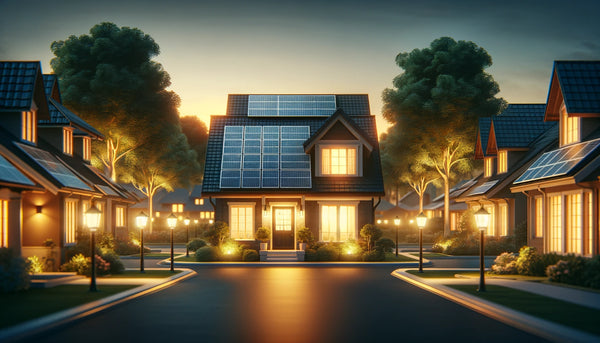In recent years, there has been a significant shift towards sustainability and environmentally-friendly practices in various aspects of our lives. One area where this change is particularly evident is in the way we power our homes. As concerns about climate change and carbon emissions continue to grow, more homeowners are turning to renewable energy sources such as solar power to meet their electricity needs. In this article, we will explore how installing solar panels can not only illuminate your home but also reduce your carbon footprint.
Table Of Content
-
Understanding Solar Power
-
Advantages of Solar Panels
-
Considerations Before Installation
-
Conclusion
- FAQs

Understanding Solar Power
Solar power harnesses energy from the sun and converts it into electricity using photovoltaic (PV) panels. These panels are typically installed on the roof of a building or in an area with ample sunlight exposure. When sunlight hits the panels, it excites electrons in the silicon cells, generating an electric current. This electricity can then be used to power appliances, lighting, heating systems, and more within your home.
Advantages of Solar Panels
1. Renewable Energy Source
One of the most significant advantages of solar panels is that they utilize sunlight, which is an abundant and renewable resource. Unlike fossil fuels such as coal and natural gas, which are finite and contribute to greenhouse gas emissions when burned, solar energy is clean and inexhaustible.
2. Reduced Energy Bills
By generating your own electricity from solar panels, you can significantly reduce or even eliminate your dependence on the grid. This can lead to substantial savings on your energy bills over time, as you'll be drawing less power from traditional utility providers.
3. Lower Carbon Footprint
Perhaps the most compelling reason to invest in solar panels is their positive impact on the environment. Solar power produces no greenhouse gas emissions or air pollutants during operation, helping to mitigate climate change and reduce air pollution. By switching to solar energy, you can shrink your carbon footprint and contribute to a cleaner, more sustainable future.
4. Energy Independence
Solar panels provide homeowners with a greater degree of energy independence and resilience. With your own solar power system, you're less vulnerable to fluctuations in energy prices and disruptions to the grid. This can be particularly advantageous during power outages or emergencies when access to electricity is crucial.

Considerations Before Installation
While the benefits of solar panels are undeniable, there are several factors to consider before installing a solar power system:
1. Sunlight Availability
Assess the amount of sunlight your property receives throughout the year to determine the feasibility of solar panel installation. Ideally, your roof or chosen installation area should have ample, unobstructed sunlight exposure for optimal energy production.
2. Roof Condition
Ensure that your roof is structurally sound and in good condition before installing solar panels. If your roof requires repairs or replacement, it's best to address these issues before proceeding with solar panel installation.
3. Initial Investment
While solar panel installation can lead to long-term savings, it typically requires a significant upfront investment. Consider your budget and explore financing options such as solar loans, leases, or power purchase agreements (PPAs) to make solar energy more accessible.
Conclusion
In conclusion, solar panels offer homeowners a sustainable and cost-effective solution for powering their homes while reducing their carbon footprint. By harnessing the power of the sun, you can enjoy lower energy bills, greater energy independence, and a cleaner environment. As the demand for renewable energy continues to rise, investing in solar panels is not only a wise financial decision but also a step towards a greener, more sustainable future. So why wait? Illuminate your home with solar power and make a positive impact on the planet today.

FAQs
What are the benefits of installing solar panels?
Installing solar panels can lead to reduced energy bills, lower carbon emissions, greater energy independence, and increased resilience against power outages or disruptions to the grid.
Are there any considerations before installing solar panels?
Before installing solar panels, it's essential to assess the amount of sunlight your property receives, ensure your roof is in good condition, and evaluate the initial investment required for installation.
How can I finance solar panel installation?
There are various financing options available for solar panel installation, including solar loans, leases, and power purchase agreements (PPAs). Explore these options to make solar energy more accessible for your home.
What impact do solar panels have on the environment?
Solar panels produce clean, renewable energy without emitting greenhouse gases or air pollutants during operation. By switching to solar power, you can reduce your carbon footprint and contribute to a cleaner, more sustainable environment.
You May Also Like
- Solar Power and Sustainability: Reducing Your Carbon Footprint with Solar Panels
- Solar Panels for Businesses: Reducing Costs and Carbon Footprints
- Solar Panels for Businesses: Cutting Costs and Carbon Footprints
- The Benefits of Home Battery Storage Systems for Energy Independence
- Going Green with Solar Panels: Benefits for Your Home and the Environment
External Links
- The Promise Of Solar Energy: A Low-Carbon Energy Strategy For The 21st Century
- Solar Energy: Benefits and Drawbacks
- Reducing Your Carbon Footprint: How Commercial Solar Panels Are Helping Businesses Go Green
- The Promise Of Solar Energy: A Low-Carbon Energy Strategy For The 21st Century
- How does solar power work?

